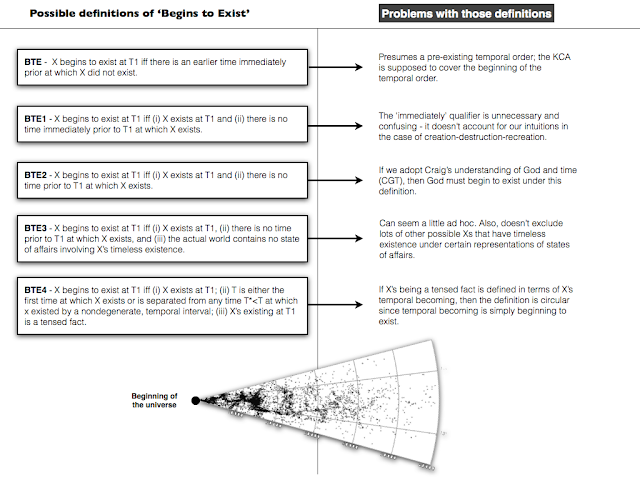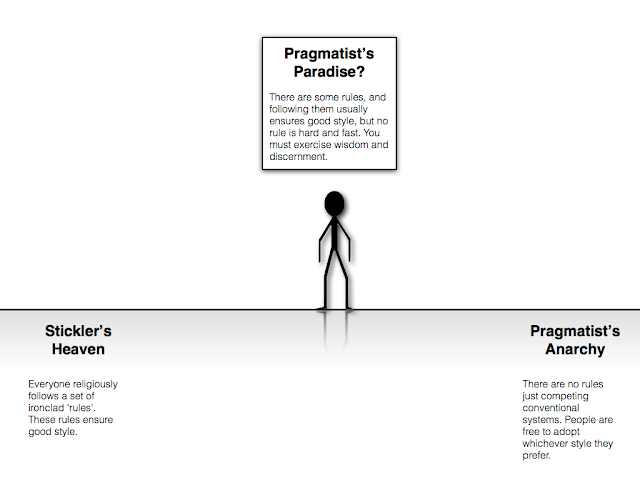The Kalam Cosmological Argument (KCA) opens with the following premise:
(1) Whatever begins to exist has a cause of its existence
From there, the argument continues with the observation that the universe began to exist and ends with the conclusion that God must be the cause of the universe’s existence. But premise (1) is the motivating principle. William Lane Craig defends it thusly:
Premise (1) seems obviously true — at the least, more so than its negation. First and foremost, it’s rooted in the metaphysical intuition that something cannot come into being from nothing. To suggest that things could just pop into being uncaused out of nothing is to quit doing serious metaphysics and to resort to magic. Second, if things really could come into being uncaused out of nothing, then it becomes inexplicable why just anything and everything do not come into existence uncaused from nothing. Finally, the first premise is constantly confirmed in our experience. Atheists who are scientific naturalists thus have the strongest of motivations to accept it.
(Craig 2008, 111-112)
There’s a certain appealing bombasticism to this line of reasoning, but I’m not so sure that it is obviously true. As others before me have pointed out, premise (1) might be pretty compelling when considering how events occur in the universe (i.e. in the realm of space and time). It’s much less compelling when we are trying to consider how the universe itself came into being. When we reach that point, our everyday metaphysical intuitions could go out the window. Furthermore, if the problem is that things cannot come into being out of nothing, then it's not clear why God is excluded from premise’s ambit.
The problem is neatly illustrated in a paper by Christopher Bobier entitled ‘God, Time and the Kalam Cosmological Argument’. In this paper, Bobier argues that premise (1) is flawed because there is no sensible definition of the phrase ‘begins to exist’ that retains premise (1)’s intuitively compelling nature and allows Craig to reach his desired conclusion, viz. that God is the cause of the universe. I’m going to go through Bobier’s argument in the remainder of this post.
1. The General Structure of Bobier’s Critique
Bobier’s argument begins with some observations about Craig’s conception of God. Craig argues that God is the transcendent personal cause of the universe. He also believes that once the universe exists God is temporally bound to it (i.e. that once spacetime begins, God becomes a temporal being capable of intervening in events as they unfold). This is essential given that Craig is a Christian and believes that God has actually intervened in human history.
This means that, in order for the KCA to work, Craig must invoke a very particular understanding of God’s causal relationship to space and time. Bobier refers to this as CGT (‘Craig’s view of God and Time):
CGT: In order for the Kalam to work and for Craig to retain his preferred conception of God, God must be:
A. Timeless and unchanging before the moment of creationB. Temporal from the moment of creation, but eternal in the sense that He exists without end.C. Causally prior to the universe but not temporally prior.
Taking this conception of God onboard, Bobier’s argument is structured as dilemma (or maybe more properly a paradox). He thinks that there is no way for Craig to affirm both the KCA and the CGT without also forcing the conclusion that God must have had a cause of his existence (which, of course, defeats the whole purpose of the argument):
Bobier’s Dilemma/Paradox: If you affirm both the KCA and CGT, then you must conclude that God had a cause of his existence and hence that either the KCA or the CGT is false.
The problem stems from the phrase ‘begins to exist’. If God is atemporal before the moment of creation, but then becomes temporal at that moment, then it seems like he must ‘begin to exist’. And if he begins to exist he must, according to premise (1), have a cause of his existence. Therefore, God (as conceived by Craig) doesn’t really solve the problem that the KCA sets out to solve.
Craig is a smart guy so he is aware of this problem. He tries to address it by coming up with more precise definitions of the term ‘begins to exist’, ones that rule out the possibility of God beginning to exist. But he must be careful when doing so. Complex and arcane definitions of ‘begins to exist’ will undermine the intuitive obviousness of premise (1). Can Craig perform the required balancing act? Bobier doesn’t think so.
2. Some initial attempts at definition
To see why, we need to consider the various ways in which the concept of 'begins to exist' can be fleshed out. Here’s a first pass at it:
BTE: X begins to exist at T1 iff there is an earlier time immediately prior at which X did not exist.
This probably best captures our everyday definition of ‘begins to exist’, i.e. the one we take for granted in our observations of events in the universe. It has also found favour with some theists (notably Swinburne). But it won’t work for the proponent of the KCA. The problem is that BTE assumes a pre-existing temporal order: it tells us that X begins to exist whenever there are prior temporal moments at which X failed to exist. The proponent of the KCA is focusing on the beginning of the temporal order itself. Any suitable definition of ‘begins to exist’ will have to take this into consideration. It will have to leave open the possibility that nothing at all (no time, no space) was in existence prior to T1. Craig tries to do this with the following definition:
BTE1: X begins to exist at T1 iff (i) X exists at T1 and (ii) there is no time immediately prior to T1 at which X exists.
The second condition here seems to do the trick. It is sufficiently liberal in its terminology to allow the possibility that the temporal order itself began at T1. But there is something fishy about it too. It is not clear why it needs to include the phrase ‘no time immediately prior’. Indeed, doing so would appear to create a difficulty since one could imagine discontinuous universes being created, destroyed and recreated again. Suppose God created the universe at T1, then destroyed it at T2 (eliminating all of spacetime), only to create the exact same universe at T3. Under BTE1 this means the universe would begin to exist again at T3. But according to Bobier this is not consistent with our intuitions. We would be more likely to say that the universe came back into existence at T3, not that it began to exist.
So he proposes we drop the ‘immediately’ qualifier:
BTE2: X begins to exist at T1 iff (i) X exists at T1 and (ii) there is no time prior to T1 at which X exists.
But this is still no good because it brings us to the original problem. If we strictly apply this definition, then it seems like (on CGT) God begins to exist at T1. Remember, according to CGT, God is timeless and unchanging prior to T1. He becomes temporal at that moment. Which means he exists at that moment and there was no time prior to that moment at which he existed. Therefore, he must begin to exist at T1.
3. More sophisticated definitions
Craig tries to address this problem by adding a third condition to the definition of ‘begins to exist’:
BTE3: X begins to exist at T1 iff (i) X exists at T1, (ii) there is no time prior to T1 at which X exists, and (iii) the actual world contains no state of affairs involving X’s timeless existence.
Is this any better? Well, one thing that strikes me about it is that it seems terribly ad hoc. What started out as a simple concept in an intuitively compelling principle has morphed into something with multiple conditions, the last of which looks explicitly designed to avoid the unwelcome conclusion that God begins to exist at the moment of creation. Of course, it tries not to be too ad hoc by insisting that it applies to any ‘X’ (i.e. not just God). But in doing so it opens the floodgates to all manner of things that may not begin to exist at T1 and hence may not require causes of their existence.
The argument for this is somewhat complicated. Condition (iii) refers to states of affairs in the actual world. States of affairs are ways in which the world is represented as being. They come in a few different varieties. Some states of affairs are actual, i.e. they really exist in our actual world. Some states of affairs are possible but not actual, i.e. they could exist in our actual world but do not. Other states of affairs are metaphysically or logically impossible. All states of affairs that are actual are possible; but not all possible states of affairs are actual.
Craig, along with others, defines facts in terms of obtaining states of affairs. In other words, he thinks that any state of affairs (set down in a declarative sentence) which is true of our actual world is an obtaining state of affairs and is hence a fact about our world. This has the, perhaps surprising, consequence that certain modal statements (statements about what could or could not have been) are facts about our actual world. For instance, the statement ‘2+2 could not equal 5” is a fact about the world in which we live. Another example, given by Bobier, is the statement ‘Kobe Bryant could have been seven feet tall”. This is a fact, according to Bobier, because there is no reason to think this is could not have been true in our world. The notion that modal facts are facts about our world is a somewhat controversial view in philosophy, but is defended on the grounds that if we don’t allow for such modal statements to represent facts of our world, much of what we presume to know about ourselves and others would be false. For example, the statement ‘I am alive but I could have died in that car accident last week’ seems like a true fact about my present state of existence. If I cut out the ‘could’ bit, much of what I presume to know about my personal history falls by the wayside.
Why is this important? Well, taking onboard all these distinctions, we see that there are two ways in which to interpret condition (iii):
Interpretation 1: The actual world contains no possible states of affairs involving X’s timeless existence.
Interpretation 2: The actual world contains no actual states of affairs involving X’s timeless existence.
Craig couldn’t intend interpretation 1. It is too liberal as it allows for non-obtaining states of affairs to timelessly exist prior to T1. Bobier illustrates this with an unusual example. He asks us to imagine a universe in which a single physical object exists without change or temporal distinctions. Say the physical object is Bobier's basketball. Such a universe is metaphysically possible and can be represented by the state of affairs-statement 'My basketball exists timelessly'. This has the odd conclusion that Bobier's basketball then fails Craig's definitional test. It does not begin to exist since the universe contains possible states of affairs involving its timeless existence. This could be true for all manner of possible states of affairs. (Some might resist this example on the grounds that a basketball qua physical object must exist in time, but as Bobier points out there is no reason to think that this represents a genuine metaphysical truth because we there is no reason to suppose that physical objects must exist in time. For my part, I think metaphysical reasoning of this sort is dodgy).
That leaves interpretation 2. But this has its own problems. The chief difficulty is working out the best way of stating how it is that God actually exists timelessly and so does not begin to exist at T1. One possibility is that the following statement captures the idea:
God prior to the universe exists timelessly
But this is inelegant because ‘prior to’ looks like a temporal relation. Another possibility (favoured by Craig) is:
God, without the universe, exists timelessly
This looks a bit better, but once you remember that possible but non-actual states of affairs can be obtaining, you begin to see how lots of things could exist timelessly in the same sort of way. According to BTE3, all these things would then not begin to exist at T1 and would escape the logic of the Kalam. The best example of this is the universe itself. Take the universe as a whole, i.e. not just the events and objects within it. The universe as a whole could have existed four-dimensionally (indeed, many physicists think that it actually does). A four dimensional universe is a static block: the passage of time within it is merely illusory. Hence the entire static block exists timelessly. Craig wants to argue that our universe is not actually four-dimensional because temporal change is real, not illusory; but, again, our universe could have been four-dimensional and so the statement ‘Our universe, without change, exists timelessly’ is an obtaining state of affairs. This means that our universe, according to BTE3 does not begin to exist at T1, exactly the conclusion Craig wishes to avoid.
Craig himself now rejects BTE3. He offers one further possible definition:
BTE4: X begins to exist at T1 iff (i) X exists at T1; (ii) T is either the first time at which X exists or is separated from any time T* < Tnondegenerate, temporal interval; (iii) X’s existing at T1 is a tensed fact. is a tensed fact.
This definition removes talk about states of affairs and replaces it with talk about tensed facts. Furthermore, Craig himself notes that the third condition is intended to avoid the possibility that X exists statically or timelessly (Craig 2002, 99). The problem is that in his zeal to replace talk of states of affairs with talk of tensed facts, Craig seems to be ending up with a circular definition. He himself tells us that (iii) is supposed to describe X’s act of ‘temporal becoming’ (Craig 2002, 99). But what is an act of temporal becoming if not a statement of X’s ‘beginning to exist’? In other words, isn’t the third condition now simply stating that in order for X to begin to exist at T1 it must begin to exist at T1? We have acquired no genuine insight into what it means for something to begin to exist.
So it seems then that no attempt to define the concept of 'begins to exist' is entirely satisfactory.










